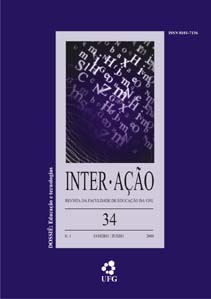GOVERNOS “PÓS-NEOLIBERAIS” NA AMÉRICA LATINA E EDUCAÇÃO
DOI:
https://doi.org/10.5216/ia.v34i1.6572Resumen
Para discutirmos a relação entre a atuação dos governos e a configuração do campo educacional faz-se necessário explicitarmos uma concepção de Estado e o papel das políticas públicas em seu âmbito. Não se pode negligenciar o fato de que a atuação dos governos submete-se ao papel que o Estado desempenha em uma forma de organização social. Nesse sentido, é fundamental que discutamos o papel do Estado na forma de organização da sociedade capitalista. Segundo Mészáros (2002), os componentes básicos da sociedade capitalista são o capital, o trabalho e o estado, tendo este último um papel importantíssimo, pois constitui a estrutura totalizadora de comando político do capital.Descargas
Descargas
Publicado
Cómo citar
Número
Sección
Licencia
A Inter-Ação utiliza como base para transferência de direitos a licença Creative Commons Attribution 4.0 para periódicos de acesso aberto (Open Archives Iniciative - OAI). Por acesso aberto entende-se a disponibilização gratuita na Internet, para que os usuários possam ler, baixar, copiar, distribuir, imprimir, pesquisar ou referenciar o texto integral dos documentos, processá-los para indexação, utilizá-los como dados de entrada de programas para softwares, ou usá-los para qualquer outro propósito legal, sem barreira financeira, legal ou técnica.
Autores que publicam neste periódico concordam com os seguintes termos:
1) Autores mantém os direitos autorais e concedem à revista o direito de primeira publicação, com o trabalho simultaneamente licenciado sob a Licença Creative Commons Attribution que permite o compartilhamento do trabalho com reconhecimento da autoria e publicação inicial nesta revista.
2) Autores têm autorização para assumir contratos adicionais separadamente, para distribuição não-exclusiva da versão do trabalho publicada nesta revista (ex.: publicar em repositório institucional ou como capítulo de livro), com reconhecimento de autoria e publicação inicial nesta revista.
3) Autores têm permissão e são estimulados a publicar e distribuir seu trabalho online (ex.: em repositórios institucionais ou na sua página pessoal) a qualquer ponto antes ou durante o processo editorial, já que isso pode gerar alterações produtivas, bem como aumentar o impacto e a citação do trabalho publicado.















